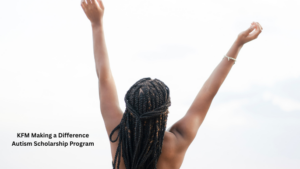This guest post is by Mitchell Waits, a young man on the autism spectrum who has been accepted into the University of Alabama. Mitchell is applying for the Spring 2020 Making a Difference Autism Scholarship via the nonprofit KFM Making a Difference started by me, Kerry Magro. I was nonverbal till 2.5 and diagnosed with autism at 4 and you can read more about my organization here. Can I ask for a favor? I’m trying to make this nonprofit self-sufficient so I can make this my full-time job supporting the special needs community and would appreciate you taking a minute before reading on to watch this video below and subscribing to our Youtube page here to get to learn more about the work we do in the community.
I hope you can support my nonprofit like I’m trying to support these students with scholarship aid for college. Learn more on how you can help our cause with a small donation (just asking for $3 today, equal to your daily cup of coffee) here.
“Queen to E2, check. Your move, Dave.”
“Ugh, I give up, you win.”
“No, I haven’t won yet, there’s still a few moves left.”
“Yeah, but I can’t do anything to stop you, and it’ll be like 12 moves before you actually checkmate me. So I surrender.”
“But we have to finish it, we can’t just stop in the middle.”
“We did finish, I surrendered and you won,” he said as he stood up to leave. He held out his hand, “Good game.”
“No! We have to finish the rest of the game!” I said, refusing to acknowledge his outstretched hand.
This chess game I had with my brother is just one example of me not wanting to end things partly finished, even though for everyone else it’s perfectly acceptable to do so. Surrendering a game when you are sorely losing and offering a draw when both players have no chance of winning are both common occurrences in the game of chess; occurrences which I did not like at all. This leads to many conflicts with other people that I don’t know how to handle.
Social interactions have always been hard for me, from knowing what to say and what not to say, to knowing what to do with my body and what reaction to give during a friend’s anecdote. On top of all that, everyone else seems to have a secret code that they inherently know that I somehow didn’t get, meaning I’ve had to figure out the details of that secret code all by myself. It doesn’t help that everyone assumes you know the code and act condescending when you don’t follow it.
Once I started to realize that I was pretty different from other people at interacting with others socially, I tried to get better by first just watching people and copying them in the way that acted and what they said and how they said it. Then I started taking and adopting little things from some of my friends, certain phrases, or motions, or things of that nature. Then over time I either kept those things or discarded them, and if I kept them I usually changed them a little bit as I kept using them to make them my own.
For example, I regarded one of my friends, Erik, as a very cool friend, and so I would periodically take one of the phrases he would say and pepper it into my everyday conversations.
Another thing that helps me is I try to act exactly the same in every circle that I’m in, whether it’s at church, theatre, or even online, that way I don’t have to remember many different ways to act and I don’t have to be worried about doing the wrong thing in the wrong circle. I used to try to create a persona of myself for each circle to better fit in with that group. However, it was much harder to remember which particular parts of myself I was supposed to use in each group. So now I just act the same everywhere, regardless of who’s there.
While my original goal was “Be indistinguishable from everyone else,” now my goal has evolved into “It’s ok if you’re not like everyone else, just don’t be so far out there that they try to distance themselves from you.”

Follow my journey on Facebook, my Facebook Fan Page, & Instagram!
My name is Kerry Magro, a professional speaker and best-selling author who is also on the autism spectrum that started the nonprofit KFM Making a Difference in 2011 to help students with autism receive scholarship aid to pursue a post-secondary education. Help support me so I can continue to help students with autism go to college by making a tax-deductible donation to our nonprofit here.














